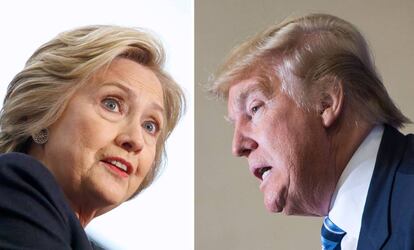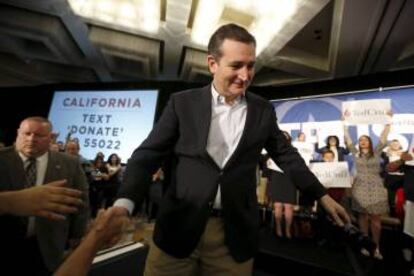Hillary Clinton, the only hurdle left between Trump and the White House
The US race will be tight: although Trump is the most unpopular candidate in recent memory, Clinton ranks second


Hillary Clinton is the only obstacle standing between Donald Trump and the White House.
The New York billionaire will be the Republican nominee in the November presidential election: his Tuesday victory at the Indiana primary, and the decision by Texas senator Ted Cruz and Ohio governor John Kasich to quit the race, means that Trump has no more Republican rivals to contend with.
At age 69, Trump has connected with the Republican voter base through his anti-immigration, anti-elite rhetoric. But he remains unpopular with other voters, and faces a complicated race against the 68-year-old Clinton, the likely candidate for the Democratic Party.
Trump has forced the political world to ingest a sizable dose of humility
Professor Larry Sabato
The possibility that Trump will be the next president of the United States, the commander-in-chief of the first world power, the man with access to the nuclear button and command over the most powerful armed forces in history, is now more of a reality than ever.
After successfully completing the extremely tough primaries test – an exhausting, nearly year-long process that has left enormous talents by the wayside in the past – Trump is just a step away from the White House. Any last-minute surprises notwithstanding, former first lady, senator and secretary of state Hillary Clinton will be the only person standing in the way of the anti-establishment billionaire.
Clinton is one of the most veteran figures in US politics, and one of the most readily identified with the reviled establishment, that nebulous conglomerate of political and economic elites from Washington DC and New York. Although she lost the Indiana primary to Vermont senator Bernie Sanders, arithmetically it is practically impossible for him to stop Clinton from becoming the Democratic nominee in July, once the primaries have officially ended.
Sign up for our newsletter
EL PAÍS English Edition has launched a weekly newsletter. Sign up today to receive a selection of our best stories in your inbox every Saturday morning. For full details about how to subscribe, click here.
Trump and Clinton belong to the same generation. They both have ties to New York: the former because he was born there, the latter because she turned the city into her political domain during her period as a senator. Both were part of the same social circle made up of New York political and business leaders. Trump even donated money to Clinton campaigns in the past.
But the similarities end there. Trump is a non-politician, and if he were to win in November he would be the first president without experience in public office since Dwight Eisenhower in 1953 (with the difference that General Eisenhower had won World War II).
Until just a few months ago, Trump was viewed as an eccentric character with no ability to hold public office – a figure better suited to TV reality shows and gossip magazines than high-flying politics. Underestimating him was the first mistake that his adversaries made.
Clinton’s biggest devotees like to say that, if she wins in November, she will be more than the first woman to be the US president. Never before, since the days of founding father George Washington, would there have been another president with as much experience as herself. They may be exaggerating, but the Democratic hopeful has a matchless resume compared with most of her predecessors, including her own husband Bill, who was president between 1993 and 2001.

The cold data are troubling for Trump and the Republican Party. After constantly offending and insulting Latinos, Muslims, blacks, women, the disabled and his fellow conservatives during the entire campaign race, Trump has most of the country against him.
The average of the main polls show Clinton winning by more than six points. Trump is viewed unfavorably by 67% of Americans overall, 75% of women, 74% of young voters, 91% of African Americans, 81% of Latinos, 73% of college-educated whites, 66% of white women and 72% of moderates, according to a recent survey by the Washington Post and ABC.
Which does not mean that these figures cannot change: that’s what campaigns are for. And even though Trump is the most unpopular candidate in recent memory, Clinton ranks second after him, dogged by decades in the spotlight and the aura of suspicion that has always enveloped her family. This will be a campaign of unpopular politicians.
The Republican hopeful also has the electoral map against him: it’s not the greatest number of votes in the ballot boxes that makes one president; rather, each state has an assigned number of electors, and whoever wins in a state takes all of the state’s electoral votes. The candidate who manages 270 electoral votes wins the presidential race.
The urban, high-density states that tend to vote Democratic have more electoral votes than the rural states that vote Republican. That is to say, the Democrats have a built-in advantage. Trump would need to conquer many Democratic feuds and seduce voters who now view him with hostility.
But there are no certainties in this campaign. Very few people anticipated that the real estate tycoon and TV showman would end up where he is today. Trump is redefining the rules, and very few lessons from earlier campaigns are of any use now.
“Trump has forced the political world to ingest a sizable dose of humility,” writes Professor Larry Sabato of the University of Virginia, one of most reliable election fortune-tellers around.
Republicans dream of the possibility that the e-mail case —the private server that Clinton used while serving as state secretary— will end up in the hands of the justice system. Uncertainty is part of every election —there could always be a natural disaster, an attack, a health setback, a scandal— and Trump has made the unforeseeable one of his most efficient electoral weapons.
English version by Susana Urra.
Tu suscripción se está usando en otro dispositivo
¿Quieres añadir otro usuario a tu suscripción?
Si continúas leyendo en este dispositivo, no se podrá leer en el otro.
FlechaTu suscripción se está usando en otro dispositivo y solo puedes acceder a EL PAÍS desde un dispositivo a la vez.
Si quieres compartir tu cuenta, cambia tu suscripción a la modalidad Premium, así podrás añadir otro usuario. Cada uno accederá con su propia cuenta de email, lo que os permitirá personalizar vuestra experiencia en EL PAÍS.
¿Tienes una suscripción de empresa? Accede aquí para contratar más cuentas.
En el caso de no saber quién está usando tu cuenta, te recomendamos cambiar tu contraseña aquí.
Si decides continuar compartiendo tu cuenta, este mensaje se mostrará en tu dispositivo y en el de la otra persona que está usando tu cuenta de forma indefinida, afectando a tu experiencia de lectura. Puedes consultar aquí los términos y condiciones de la suscripción digital.








































